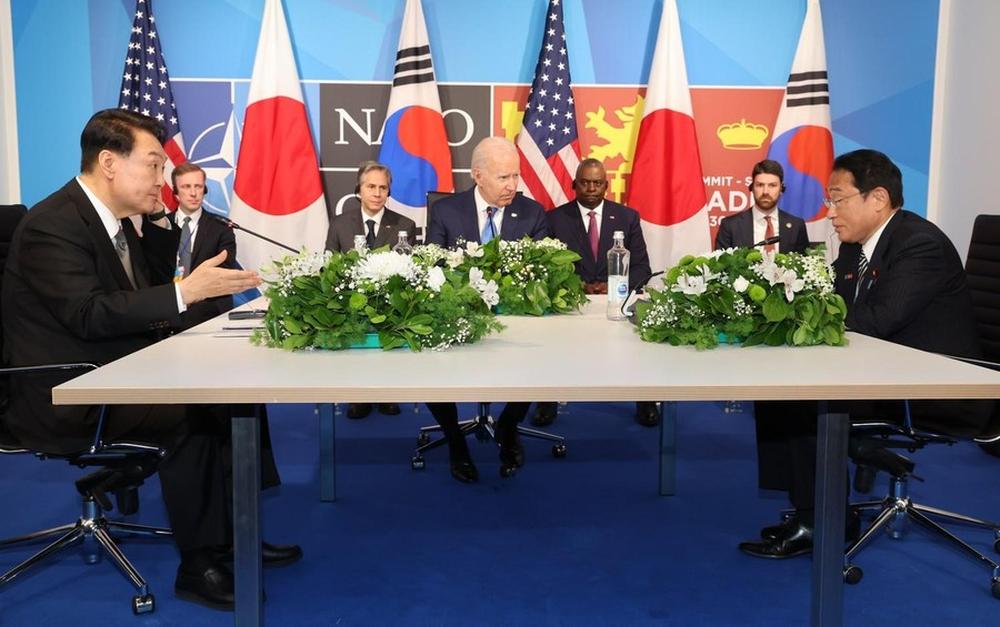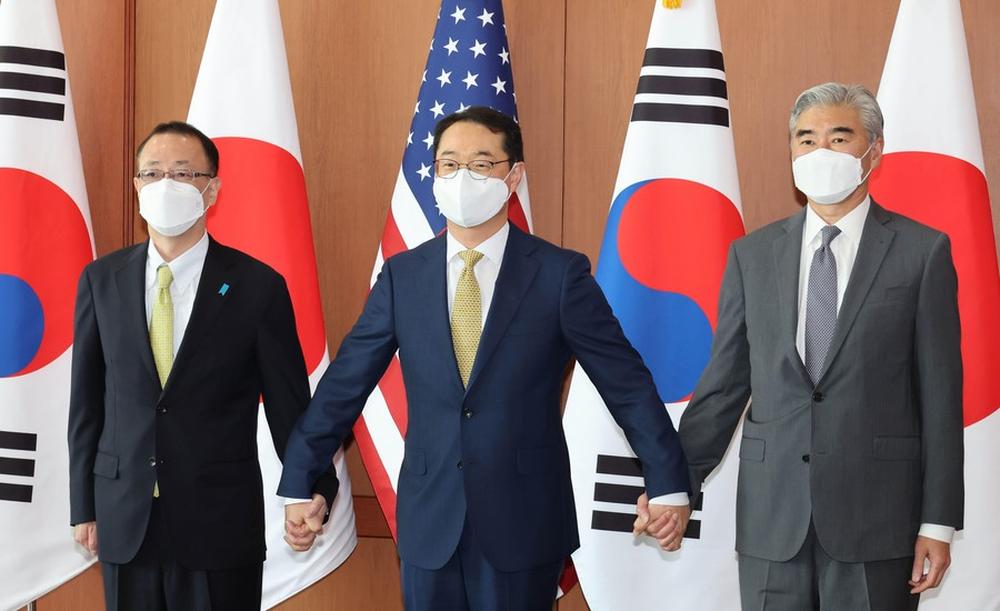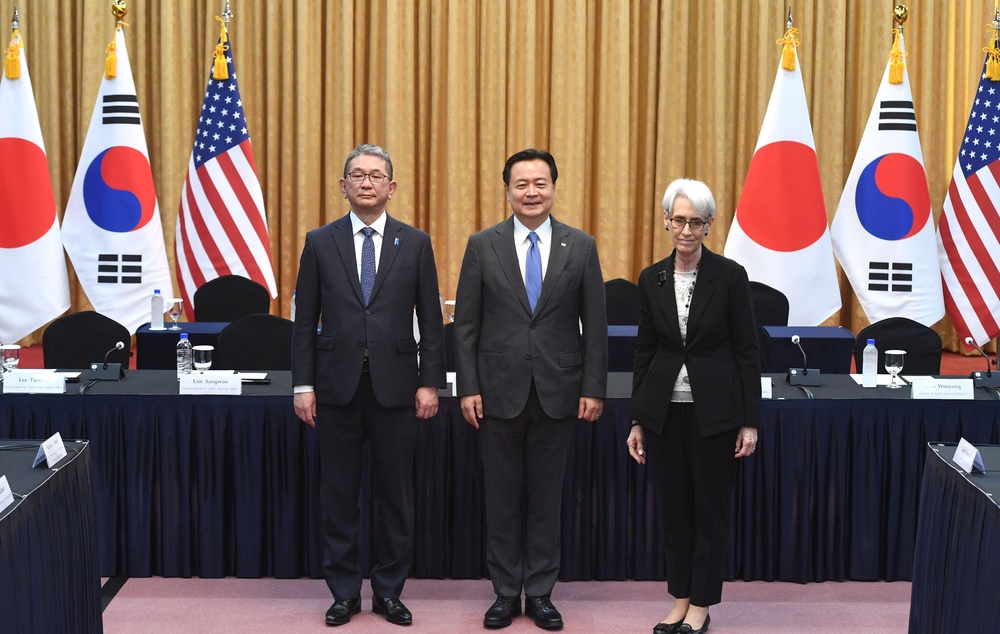- #Japan
- #Multilateral Relations
- #Nuclear & Missile Issues
- #South Korea
- #US-ROK Alliance

► During the Korea-U.S. summit meeting held in Seoul on May 21, the two countries agreed to expand the ROK-U.S. alliance, the linchpin for peace and prosperity in the region, beyond the Korean peninsula into a global comprehensive alliance based on shared values. The two countries agreed on the importance of trilateral cooperation between Korea, the U.S., and Japan in responding to the challenge of North Korea and strengthening the rules-based international order.
► At the first ROK-U.S.-Japan defense ministerial meeting, while agreeing on the importance of trilateral cooperation, Japan did not agree to a Korea-Japan defense ministerial meeting.
► Whether or not the two countries can start a policy (strategy) dialogue based on evaluating and responding to changes in the international situation and security environment surrounding the two countries can be a litmus test that estimates the possibility of security cooperation between Korea and Japan and Korea, the U.S. and Japan.
The historical dispute originating from Japan's colonization of the Korean peninsula has been a factor undermining friendly ROK-Japan relations since the normalization of diplomatic relations in 1965. More recently, conflicts centered around historical disputes, such as the "comfort women" issue and forced labor issue, are significantly affecting the economic and security domains. As a result, over the course of five years during the Moon Jae-in administration, despite the leaders of both countries frequently meeting and talking on the phone when attending the Olympics or international conferences, neither leader visited the other country purely to discuss bilateral issues.
It is notable that the Japanese government initiated diplomatic talks with Korea after the start of the Yoon Suk Yeol administration, which is emphasizing the need for a new perspective on ROK-Japan relations and the strategic importance of normalizing ties with Japan. However, this was due to changes in the security environment surrounding Japan and the push from the United States to emphasize trilateral cooperation between Korea, the U.S., and Japan, and does not signal a fundamental change in Japan's policy toward South Korea.
During the Korea-U.S. summit meeting held in Seoul on May 21, just 11 days after President Yoon's inauguration, the two countries agreed to expand the ROK-U.S. alliance, the linchpin for peace and prosperity in the region, beyond the Korean peninsula into a global comprehensive alliance based on shared values. Moreover, the two countries agreed on the importance of trilateral cooperation between Korea, the U.S., and Japan in responding to the challenge of North Korea and strengthening the rules-based international order.
Two days later, at the U.S.-Japan summit meeting in Tokyo on the 23rd, the two countries reaffirmed that the U.S.-Japan alliance, the cornerstone of a "free and open Indo-Pacific region," is stronger than at any time, and stressed the "critical importance of close ties and cooperation among Japan, the United States, and the ROK, including security ties.“
In addition, in the Joint Leaders' Statement, the U.S. and Japan agreed to constantly modernize the alliance and strengthen joint capabilities including by aligning strategies and prioritizing goals together. Although this shows the determination of the two countries to work together closely to respond to the shared perceived threat of China, Russia, and North Korea, there have not been in-depth policy consultations regarding these matters between Korea and Japan.
At the ROK-U.S.-Japan summit meeting with President Joseph R. Biden, Jr on June 29, the leaders of Korea and Japan, who were invited to the NATO Summit for the first time, shared their views on the nuclear and missile threat posed by North Korea and affirmed that they will closely cooperate to elevate the level of security cooperation between Korea, the U.S., and Japan. Prior to this, at a meeting between the Korean, U.S., and Japanese defense ministers in Singapore on June 11, the three countries also agreed to conduct trilateral missile warning and ballistic missile search and tracking exercises and to identify further trilateral actions in order to address North Korea's ballistic missile launches.
Although Korea, the U.S., and Japan all emphasize the need for security cooperation, the problem is that, unlike Korea and the U.S. and the U.S. and Japan, Korea and Japan do not even have a regular channel to discuss this issue. In addition to the U.S., Japan's only ally, Japan initiated 2+2 Ministerial Dialogues in diplomacy and defense with various countries, including Australia (starting in 2007), Russia (2013), France (2014), the U.K. (2015), Indonesia (2015), India (2019), Germany (2021), and the Philippines (2022), but Japan is taking a passive approach to bilateral dialogue with Korea. At the first ROK-U.S.-Japan defense ministerial meeting following the inauguration of the new Korean administration on June 11, while agreeing on the importance of trilateral cooperation, including information sharing on regional security issues, high-level policy consultation, and combined exercises, Japan did not agree to a Korea-Japan defense ministerial meeting.
A section was deleted from the "Defense of Japan" published by Japan's Ministry of Defense in 2018 stating that close security cooperation with Korea, "the most important neighboring country, which shares strategic interests, and is extremely vital to Japan in geopolitical terms," has "enormous significance for the peace and stability of the Asia-Pacific region." In addition, in the 2019 "Defense of Japan," in the section on security cooperation with countries other than the United States, Korea, which had previously been placed second after Australia, was placed after Australia, India, and ASEAN.
Moreover, following Japan's decision to withdraw its Maritime Self-defense Force from an international fleet review in Jeju due to a conflict over hoisting the "rising sun" flag in October 2018, ROK-Japan defense cooperation and exchanges were also suspended due to a conflict in December over whether a Japanese surveillance aircraft had flown at a low altitude to threaten a Korean destroyer or whether a Korean destroyer had targeted a Japanese surveillance aircraft with its fire-control radar. Regarding this, the "Defense of Japan" stated that since the "negative actions by the ROK side are affecting Japan-ROK defense cooperation and exchange," Japan will continue to urge the ROK side to appropriately deal with these concerns so as not to impair cooperation between Japan and the ROK and between Japan, the United States, and the ROK. This stance remains unchanged in the 2022 "Defense of Japan" published on July 22.
Unfortunately, the "two-track approach" that had previously kept historical issues from hindering cooperation in the areas of the economy, security, and private sector exchange is no longer effective in ROK-Japan relations. Historical, economic, and security issues and even public sentiment have become intertwined, making it more difficult to find solutions that will improve bilateral relations.
Amid this situation, Japan is emphasizing the need to strengthen deterrence and response capabilities as a means of ensuring its own security. During the U.S.-Japan summit meeting, Prime Minister Kishida stated his determination to "fundamentally reinforce Japan's defense capabilities" and "secure substantial increase of its defense budget needed to effect it" to President Biden, receiving strong support from the U.S. president.
Moreover, in his keynote address at the Shangri-La Dialogue in June and statement at the NATO Summit, Prime Minister Kishida clarified once again Japan's determination to significantly increase its defense budget to fundamentally reinforce Japanese defense capabilities "within five years." During the House of Councillors election on July 10, Prime Minister Kishida called for increasing the defense budget to two percent of Japan's GDP over five years, which is the spending target proposed by NATO nations. If achieved, the Japanese defense budget will be the third largest in the world after the U.S. and China.
Japan has upheld the basic principle of its exclusively defense-oriented policy, which prohibits attacking other countries and having offensive weapons, but allows for the mobilization of forces for self-defense when attacked by another country. However, the Japanese government is now considering whether it should acquire counterattack capabilities. Acquiring counterattack capabilities, meaning doing away with the exclusively defense-oriented policy, signifies a major shift in Japan's defense policy, and, along with the extent to which Japan strengthens its defense capabilities, could have a major impact on the situation on the Korean peninsula and the surrounding region.
On July 22, the Yoon administration announced plans to promote cooperation between Korea and Japan and Korea, the U.S., and Japan at the policy and strategy levels as well as the gradual expansion of trilateral security cooperation. Although this has been proposed as a national goal in the domains of diplomacy and security, the administration is still working on refining these plans. In his keynote address at the Shangri-La Dialogue, Prime Minister Kishida said that Japan will enhance Japanese defense capabilities within the scope of the Constitution and in compliance with international law and will explain its approach to other countries in a transparent and thorough manner. Therefore, it will be necessary to see how Japan explains its approach to Korea.
Even though Korea and Japan share basic values, such as a market economy, democracy, and human rights, and are both allies of the United States, the two countries have different perspectives on security cooperation in Europe and the Indo-Pacific region as well as the China and Taiwan Strait issues. Moreover, by the end of the year, Japan plans to revise its "National Security Strategy" and formulate a "National Defense Strategy" and a "Defense Program" to replace the "National Defense Program Guidelines" and "Medium Term Defense Program." If these documents are produced without sufficient policy consultation between Korea and Japan, ROK-Japan and ROK-U.S.-Japan security cooperation may become nothing more than rhetoric.
Whether or not the two countries can start a policy (strategy) dialogue based on evaluating and responding to changes in the international situation and security environment surrounding the two countries can be a litmus test that estimates the possibility of security cooperation between Korea and Japan and Korea, the U.S. and Japan.
Jin-goo Cho is an assistant professor and Director of the Japan Center at the Institute for Far Eastern Studies(IFES), Kyungnam University. Prior to joining(IFES), he was a policy assistant of the National Unification Advisory Council which is a presidential administrative organization. He was also a research professor at Korea University’s Peace & Democracy Institute(PDI). He is a member of the Advisory Committee of the Ministry of Foreign Affairs, Republic of Korea. As an academic, his research focuses primarily on Northeast Asian international relations, comparative studies between the ROK-U.S. alliance and U.S.-Japan alliance, and relations between North and South Koreas and Japan. Recently he has interests in reconciliation and cooperation among East Asian countries. He receives his Ph.D. in international politics from the University of Tokyo, an M.A. in international relations from the University of Shizuoka, Japan, and a B.A. from Korea University in Sociology, ROK. He is the co-author of New Order in Northeast Asia and the Future of the Korean Peninsula(2019, Korean), and Changes in the Korean Peninsula and Inter-Korean Relations(2021, Korean). He also wrote many academic articles including “Japan’s Postwar Asian Reparation Diplomacy and Historical Perceptions: Achievements and Limitations of Inter-governmental Reconciliation”(2020, Korean) and “Moon Jae-in Administration’s Japan Policy – Focused on the Issue of the Japanese Military “Comfort Women” - ”(2019, Korean).

